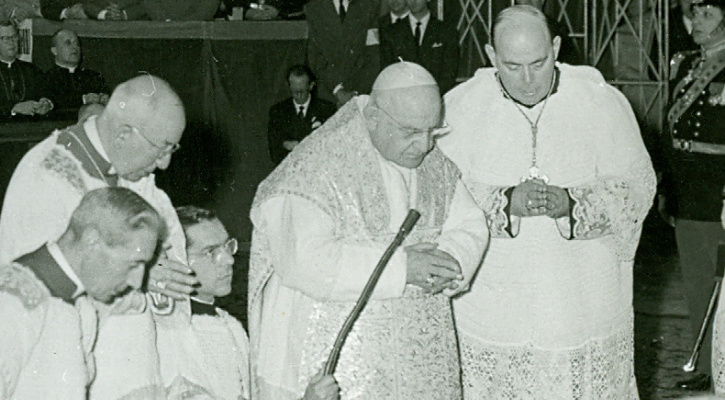Saint John XXIII, Saint of 11 October 2020

Although few people have had such a great impact on the XNUMXth century as Pope John XXIII, he avoided the limelight as much as possible. Indeed, one writer has noted that his "ordinariness" seems to be one of his most notable qualities.
The eldest son of a farming family in Sotto il Monte, near Bergamo in northern Italy, Angelo Giuseppe Roncalli has always been proud of his down-to-earth roots. In the diocesan seminary of Bergamo he joined the Secular Franciscan Order.
After his ordination in 1904, Fr. Roncalli returns to Rome to study canon law. He soon worked as secretary to his bishop, Church history teacher in the seminary and as editor of the diocesan newspaper.
His service as a stretcher bearer for the Italian army during World War I gave him firsthand knowledge of the war. In 1921, Fr. Roncalli was appointed National Director in Italy of the Society for the Propagation of the Faith. He also found time to teach patristics in a seminary in the Eternal City.
In 1925 he became a papal diplomat, serving first in Bulgaria, then in Turkey and finally in France. During the Second World War he got to know the leaders of the Orthodox Church well. With the help of the German ambassador to Turkey, Archbishop Roncalli helped save around 24.000 Jews.
Appointed cardinal and appointed patriarch of Venice in 1953, he was finally a residential bishop. One month after entering his 78th year, Cardinal Roncalli was elected pope, taking the name of Giovanni from the name of his father and the two patrons of Rome's cathedral, San Giovanni in Laterano. Pope John took his work very seriously but not himself. His spirit soon became proverbial and he began to meet political and religious leaders from all over the world. In 1962 he was deeply involved in efforts to resolve the Cuban missile crisis.
His most famous encyclicals were Mother and Teacher (1961) and Peace on Earth (1963). Pope John XXIII enlarged membership of the College of Cardinals and made it more international. In his speech at the opening of the Second Vatican Council, he criticized the "prophets of doom" who "in these modern times see nothing but prevarication and ruin". Pope John XXIII set a tone for the Council when he said: “The Church has always opposed… errors. Nowadays, however, the Bride of Christ prefers to make use of the medicine of mercy rather than that of severity ”.
On his deathbed, Pope John said, “It's not that the gospel has changed; is that we have begun to understand him better. Those who have lived as long as I have ... have been able to compare different cultures and traditions and know that the time has come to discern the signs of the times, to seize the opportunity and to look far ahead “.
The "good Pope John" died on June 3, 1963. St. John Paul II beatified him in 2000 and Pope Francis canonized him in 2014.
Reflection
Throughout his life, Angelo Roncalli collaborated with the grace of God, believing that the work to be done was worthy of his efforts. His sense of God's providence made him the ideal person to foster a new dialogue with Protestant and Orthodox Christians, as well as with Jews and Muslims. In the sometimes noisy crypt of St. Peter's Basilica, many people are silent upon seeing the simple tomb of Pope John XXIII, grateful for the gift of his life and holiness. After his beatification, his tomb was moved to the basilica itself.